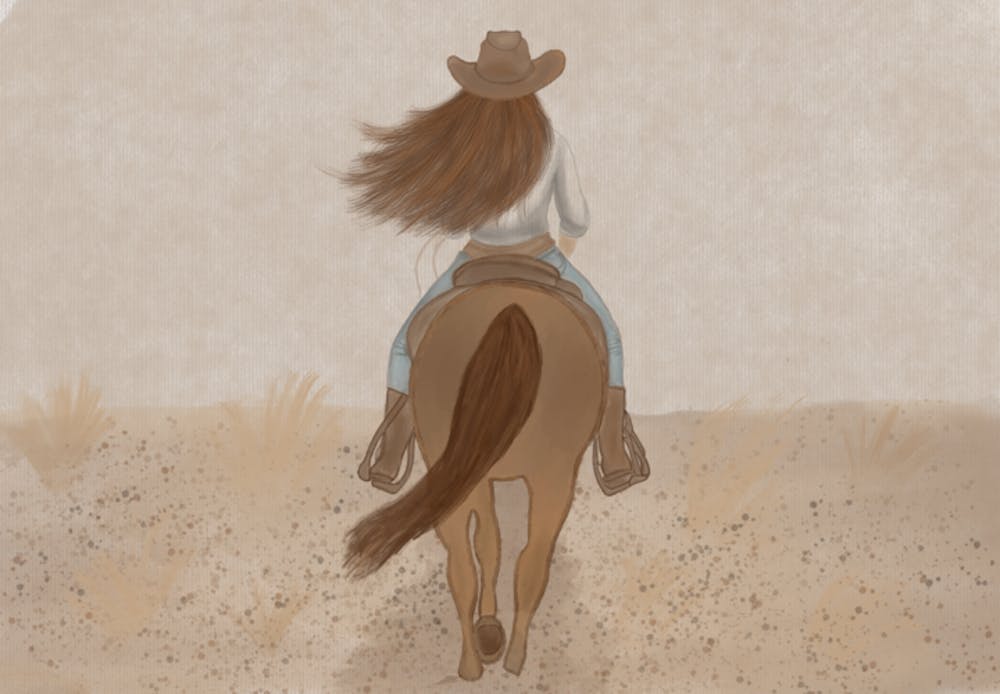Third-year mass communications and sports media student, Darby Bianco’s photojournalism class was giving out awards when a classmate called out to the professor: "You should give her (Bianco) the horse girl award. "
That term has followed Bianco for years, and it does not have a positive connotation, she said.
To her, the term “horse girl” represents a sport she’s been passionate about her whole life, but those who label her a “horse girl” often correlate her passion of horseback riding to hobby horsing, or someone who eats horse feed, Bianco said.
“It's kind of frustrating when everyone takes a term that should have a lot of like meaning and turns it into like this, crappy thing to make fun of other people,” Bianco said.
The equestrian industry is nothing to laugh about, she said.
"To me, horseback riding is a culture, and it's a culture that people don't understand and they kind of blow off," Bianco said.
Bianco competes in an equestrian discipline called eventing. Eventing is a triathlon-style event where the horse and rider are judged for three phases: dressage, cross country and show jumping, according to US Equestrian.
Bianco rides for the Carolina Eventing Club, a club team affiliated with the university that competes in eventing against other colleges.
Still, the fact that some of her peers deny that her equestrian pursuit is a sport at all frustrates her, Bianco said.
“We are athletes,” Bianco said. “We have the same kind of passion for our sport that the hockey players have for hockey or the basketball players have for basketball, like we put in the same amount of work.”
Unlike the NCAA Equestrian team, which competes on the flat and over fences, eventing is not an NCAA sport, club president and fourth-year advertising student Kendall Eaves, said.

Since eventing is an Olympic sport, it is only nationally televised once every four years, Eaves said.
Apart from that, the sport gets very little media attention, but, equestrians are trying to change that, she said.
“A lot of these riders are getting more active on social media to connect with followers and more people to help them understand kind of what our sport’s about,” Eaves said.
Horseback riding takes commitment, club member and third-year public health student Riley Hoge, said.
“A lot of people don't realize the amount of effort and work that goes into it, not just physically, but mentally, too, because you're working with something that really does have a mind of its own,” Hoge said.
People unfamiliar with the sport may think it's effortless, Eaves said, but that's the point.
“From people on the ground, you can tell when a horse and rider have such a connection and trust when their riding looks easy, and that's the key," Eaves said.
Physically the sport is still demanding. Bianco trains six days a week by going the gym and riding her horse, Nemo, she said.
“I have to have a strong enough core, I have to have enough muscle to be able to control a 1200 pound animal with, quite literally, my legs and my core strength," Bianco said.
While the club doesn’t have a set barn, a few girls join Bianco at the Northern Spy Farm in Aiken, South Carolina, which creates a team camaraderie, Bianco said. The farm is an hour away from campus.
The club meets bi-monthly, more if they have an event or volunteer opportunity coming up,Hoge said.
As a school-affiliated club, USC Eventing is required to get service hours by volunteering at horse shows, making cards to donate to kids in hospitals or other volunteer work, Hoge said.
Eaves said during her four years in the club, she and the rest of the girls have built up the club to compete regularly. Recently, Eaves secured money from the school, although they don’t have an official university-appointed trainer, she said.
The club also doesn’t have extra horses for members who don’t own their own, Eaves said, but not every member has to compete to be on the team.
"We've got the non competing members who are part of the team, and they come, like, on the ground to like shows and like events and stuff to help out," Bianco said.
Hoge said that her main reason for joining USC eventing was to find a club made up of like-minded individuals.
"They say that's like one of the easiest ways to find friends," Hoge said. "And I think that that's just what I was looking for."
Eaves said that no matter what stigma follows equestrians, the majority of people in the equestrian world are connected by a genuine love for horses and the sport.
Eaves’s favorite part of being a ‘horse girl’ is letting her stress melt away when she’s in her element, she said.
“I go out to the barn and forget everything. You know, be with my horse, be with the barn family, do what I love,” Eaves said.

